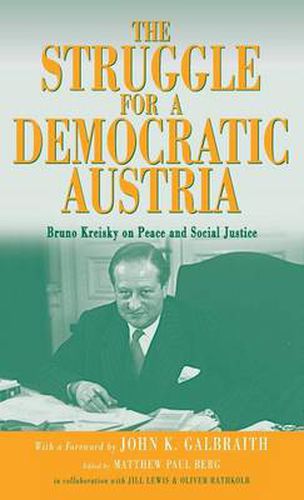Readings Newsletter
Become a Readings Member to make your shopping experience even easier.
Sign in or sign up for free!
You’re not far away from qualifying for FREE standard shipping within Australia
You’ve qualified for FREE standard shipping within Australia
The cart is loading…






This title is printed to order. This book may have been self-published. If so, we cannot guarantee the quality of the content. In the main most books will have gone through the editing process however some may not. We therefore suggest that you be aware of this before ordering this book. If in doubt check either the author or publisher’s details as we are unable to accept any returns unless they are faulty. Please contact us if you have any questions.
Bruno Kreisky (1911-1990) is undoubtedly the most prominent and influential politician to emerge in postwar Austria. For some thirty years, he helped to shape his country’s politics and raise its status in the world, first as secretary of state, then as leader of the opposition Social Democratic Party and as foreign minster, and finally as chancellor from 1970 to 1983. During his long tenure of public office, Austria achieved unprecedented levels of prosperity; he promoted electoral and educational reform and weathered the occasional scandal.
His analytical mind and intelligence were much appreciated by statesmen in East and West as well as in the academy, as were his deeply felt humanism, integrity, untiring advocacy of tolerance and social justice, and his earnest sense of responsibility. These won him the trust and admiration of the leading international figures of his era, including Tito, Nehru, Nasser, De Gaulle, and Pope John XXIII. His international connections and his position as leader of a non-aligned state allowed him to assume the role of honest broker in international peace, human rights, and development initiatives. His stature enabled him to play an active part in the promotion of the Arab-Israeli dialogue and pave the way for President Jimmy Carter’s mediation of the Israeli-Egypt peace accord through his close relationship with Sadat. As a result of such activity, Kreisky was respected and praised by every U.S. administration from Kennedy to Brezhnev, despite his support for the containment of Soviet communism.
This annotated volume - a condensed version of the three volumes of the German edition and compiled by Jill Lewis, University of Wales, and Oliver Rathkolb, Director of the Stifung Bruno Archiv - gives a fascinating insight into Kreisky’s life and his many activities. He lets us participate in the big decisions in which he was involved and shares his encounters with other world leaders of this time. Austria be a small country, but it produced at least one major leader whose lively and immensely readable account and wisdom many readers will find inspiring.
$9.00 standard shipping within Australia
FREE standard shipping within Australia for orders over $100.00
Express & International shipping calculated at checkout
This title is printed to order. This book may have been self-published. If so, we cannot guarantee the quality of the content. In the main most books will have gone through the editing process however some may not. We therefore suggest that you be aware of this before ordering this book. If in doubt check either the author or publisher’s details as we are unable to accept any returns unless they are faulty. Please contact us if you have any questions.
Bruno Kreisky (1911-1990) is undoubtedly the most prominent and influential politician to emerge in postwar Austria. For some thirty years, he helped to shape his country’s politics and raise its status in the world, first as secretary of state, then as leader of the opposition Social Democratic Party and as foreign minster, and finally as chancellor from 1970 to 1983. During his long tenure of public office, Austria achieved unprecedented levels of prosperity; he promoted electoral and educational reform and weathered the occasional scandal.
His analytical mind and intelligence were much appreciated by statesmen in East and West as well as in the academy, as were his deeply felt humanism, integrity, untiring advocacy of tolerance and social justice, and his earnest sense of responsibility. These won him the trust and admiration of the leading international figures of his era, including Tito, Nehru, Nasser, De Gaulle, and Pope John XXIII. His international connections and his position as leader of a non-aligned state allowed him to assume the role of honest broker in international peace, human rights, and development initiatives. His stature enabled him to play an active part in the promotion of the Arab-Israeli dialogue and pave the way for President Jimmy Carter’s mediation of the Israeli-Egypt peace accord through his close relationship with Sadat. As a result of such activity, Kreisky was respected and praised by every U.S. administration from Kennedy to Brezhnev, despite his support for the containment of Soviet communism.
This annotated volume - a condensed version of the three volumes of the German edition and compiled by Jill Lewis, University of Wales, and Oliver Rathkolb, Director of the Stifung Bruno Archiv - gives a fascinating insight into Kreisky’s life and his many activities. He lets us participate in the big decisions in which he was involved and shares his encounters with other world leaders of this time. Austria be a small country, but it produced at least one major leader whose lively and immensely readable account and wisdom many readers will find inspiring.